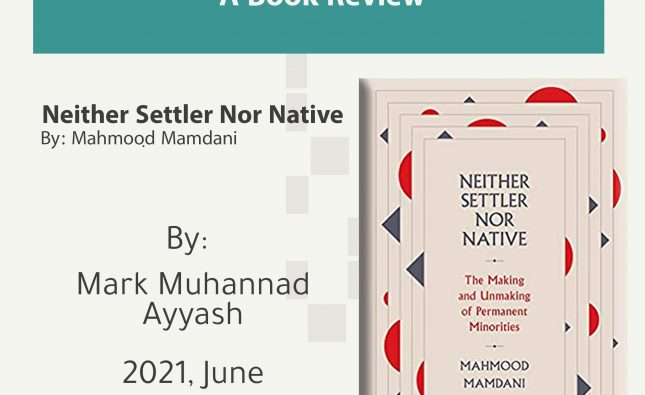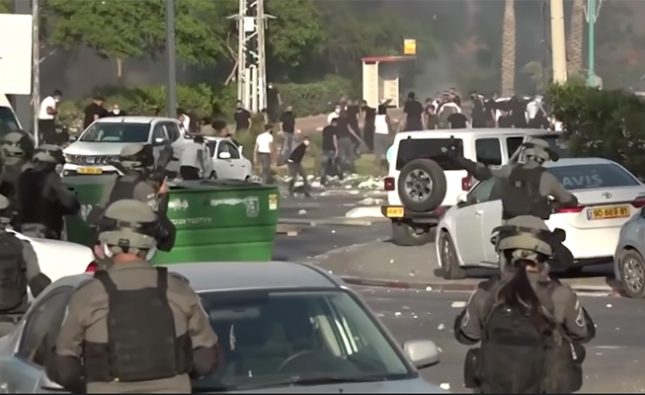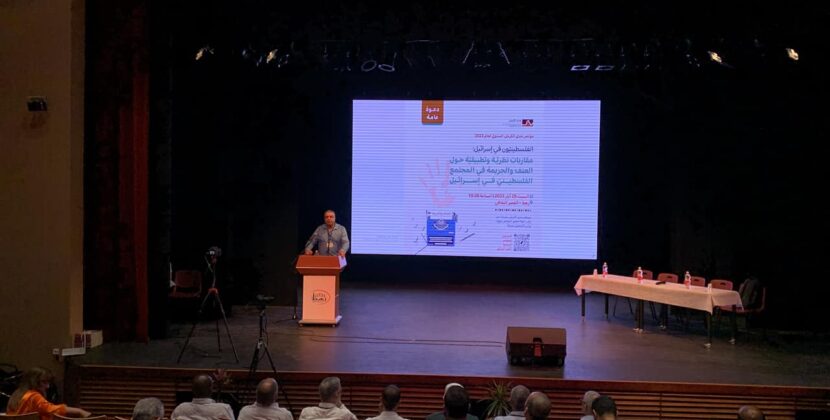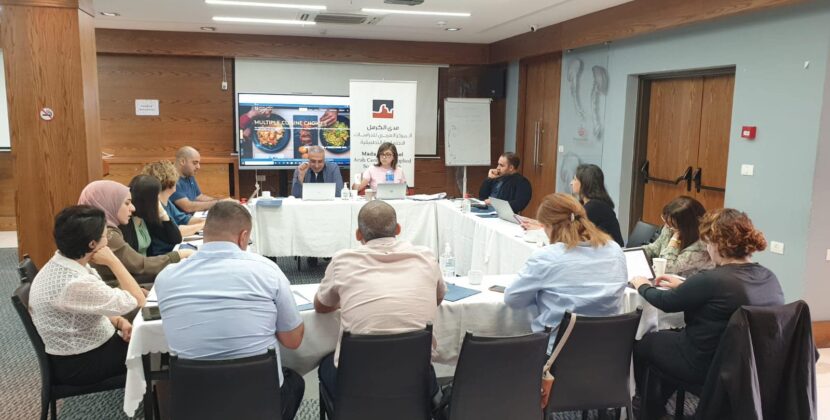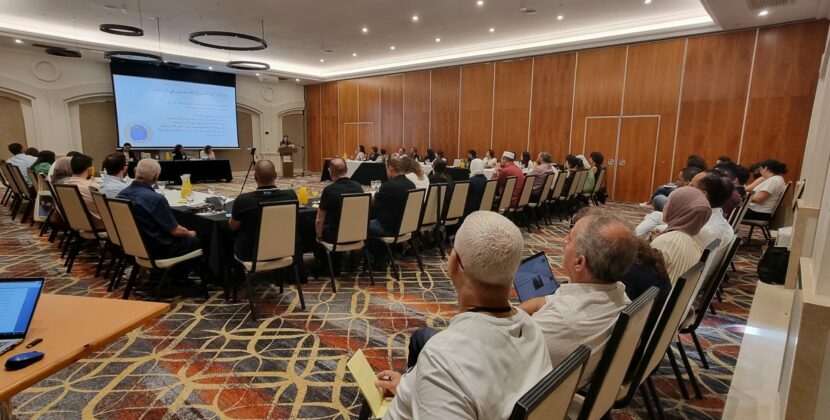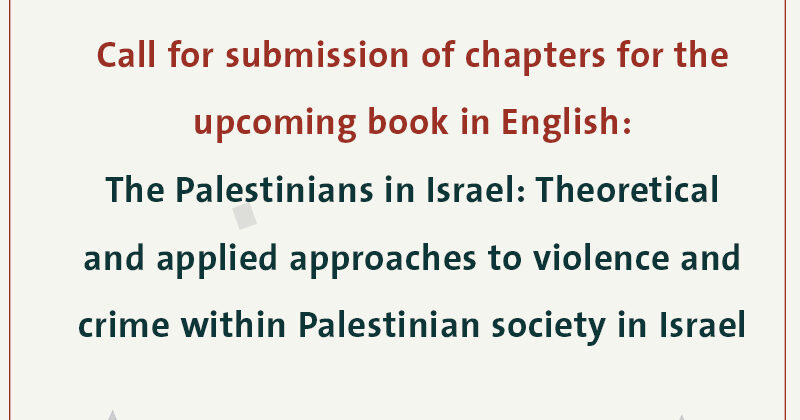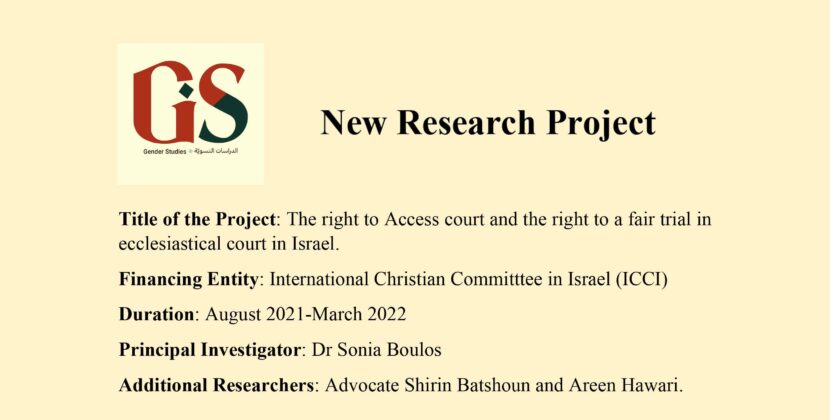 On April 15th-16th, the conference for Palestinian PhD students was held in Nazareth, which was organized by Mada al-Carmel – the Arab Center for Applied Social Research. This was the second conference that Mada al-Carmel held for PhD-students. Palestinian students studying at local and foreign universities participated in the conference and presented their research. They also listened to discussions from senior scholars – who took turns chairing the sessions – and from the public.
On April 15th-16th, the conference for Palestinian PhD students was held in Nazareth, which was organized by Mada al-Carmel – the Arab Center for Applied Social Research. This was the second conference that Mada al-Carmel held for PhD-students. Palestinian students studying at local and foreign universities participated in the conference and presented their research. They also listened to discussions from senior scholars – who took turns chairing the sessions – and from the public.
Ms. Einas Odeh-Haj, the Associate Director of Mada al-Carmel, opened the conference by saying that it aims to stimulate academic dialogue and the exchange of expertise, and that it is the continuation of Mada’s overall efforts towards the goal of supporting a new generation of Palestinian researchers. She added that the idea of the conference comes as “a challenge to the partition policy suffered by Palestinians. It is an attempt to create an intellectual framework which overcomes geographical and political barriers and contributes to developing a research agenda”. Dr. Manar Mahmoud, the coordinator of the conference, addressed its importance and the preparations that preceded it, including the formation of an academic committee that worked on reviewing and evaluating the submitted applications as well as selecting the conference’s participants. Professor Michael Karayanni from the Faculty of Law at the Hebrew University, and a member of the conference’s Academic Committee, discussed the importance of standing on an academic stage and speaking in Arabic in a supportive atmosphere, emphasizing the importance of learning from each other and exchanging expertise.
 following the opening, the sessions of the conference began, and were divided according to the research topics of the participants. The first session was about gender, led by Dr. Taghreed Yahia-Younes from Tel-Aviv University. Three students participated in this session:
following the opening, the sessions of the conference began, and were divided according to the research topics of the participants. The first session was about gender, led by Dr. Taghreed Yahia-Younes from Tel-Aviv University. Three students participated in this session:
- Ferial Khalifa – Women’s Islamic Activism: Various issues and theoretical approaches
- Dina Zbeidy – Love, Age, Magic and Mothers: Marriage issues in the discourse of civil society and refugees in Jordan
- Lana Sirri – Islamic Feminism: A response to conditional sisterhood
The second session discussed colonial perspectives and was led by Professor Nadera Shalhoub-Kevorkian from the Hebrew University, who is also the Director of the Gender Studies Program at Mada al-Carmel. The participants of this session included:
- Wassim Ghantous – Outsourcing Settler-colonialism: Israel’s outsourcing of control to private security companies, individual settlers, and the Palestinian Authority
- Taher al-Labadi – War by Other Means: A political economy of colonialism in Palestine
- Muna al-Dajani – Farming as Resistance under Occupation
The third session revolved around social studies and was led by Dr. Sami Mahajneh from the Arab Academic Institute Beit Berl. The participants of this session included:
- Sinyal Attamneh – Occupational Aspirations among Young Palestinian Females in Israel Living in Poverty: The potential of mothers’ contributions
- Adeem Massarwa – Serious Physical Violence among Arab-Palestinian Adolescents: Normative beliefs as a mediator, parental communication as a moderator
- Ahmad Badran – Stratification Consequences of Educational Choices: Elementary school choice by Palestinians in Israel
 On the second day, the fourth session of the conference dealt with the topic of planning, led by Professor Yousef Jabareen from Technion. The participants included:
On the second day, the fourth session of the conference dealt with the topic of planning, led by Professor Yousef Jabareen from Technion. The participants included:
- Kais Nasser – Planning Challenges among a Conservative Minority Community: The case of the Arab-Palestinian Minority in Israel
- Ahmad al-Atrash – Spatial Planning Strategies Towards Sustainability in the Geo-Political Context of Present Day Palestine: The case of Bethlehem
 The topic of identity formed the core of the fifth session, which was led by Professor Michael Karayanni. Three participants contributed in this session:
The topic of identity formed the core of the fifth session, which was led by Professor Michael Karayanni. Three participants contributed in this session:
- Firas Khatib – Palestinians in Israel and the Arab Satellite Channels: Identity, continuity and journalism practices
- Hama Abu Kishk – The Discourse of the Arabic Blogosphere
- Ramez Eid – Counted Voices: Anthropology and the value of local democracy in the neo-liberal state
The last session revolved around history and was chaired by Dr. Manar Hassan from Ben-Gurion University. It included three talks:
- Himmat Zu’bi – Control and Surveillance: The elimination of the Arab landscape of Haifa 1948
- Heba Yazbak – The Re-narration of History; When the Subaltern Speak: The case of internally displaced Palestinians in 1948
- Ameer Fakhoury – Identity Strategies among Arab Christian Citizens of Israel: Keepers of Arab identity or guardians of Israel’s border?
The conference lasted for two days and along with these sessions it also included workshops with the participating students. The first workshop revolved around the process of writing and completing a PhD dissertation. It was led by Dr. Ayman Agbaria from the University of Haifa and a member of the Academic Committee of the conference. The second workshop addressed challenges that students face after their PhD, including work and publication. It was chaired by Professor Michael Karayanni.
The first day concluded with an awards ceremony for PhD students, where six grants were allocated in the presence of Dr. Ayman Agbaria, who is also a member of the Awards Committee. The students who received grants are:
- Adeem Massarwa, from the Hebrew University in Jerusalem
- Firas Khatib, from SOAS in the University of London
- Haneen Naamneh, from the University of London
- Himmat Zu’bi, from Ben-Gurion University
- Abed Kana’ane from Tel Aviv University
- Lana Tator, from the University of Warwick in Australia












